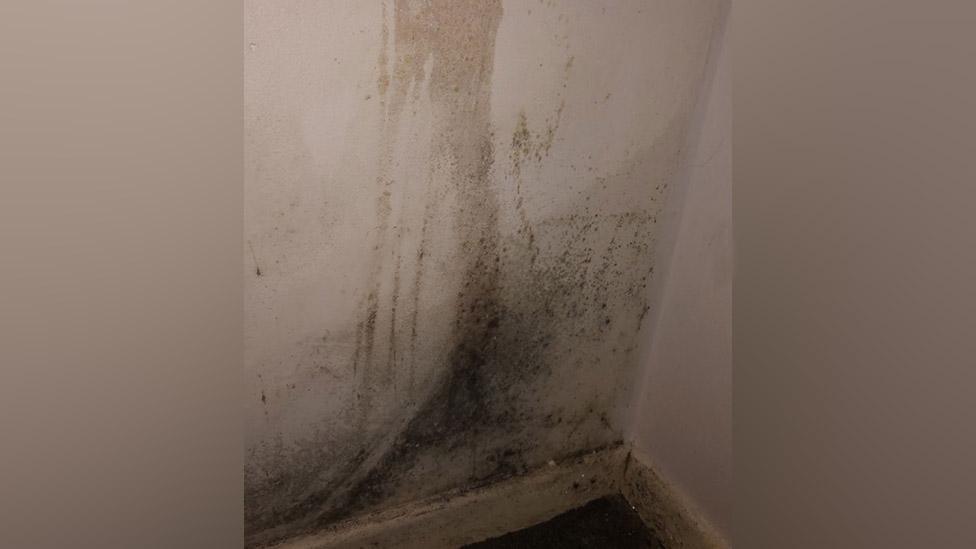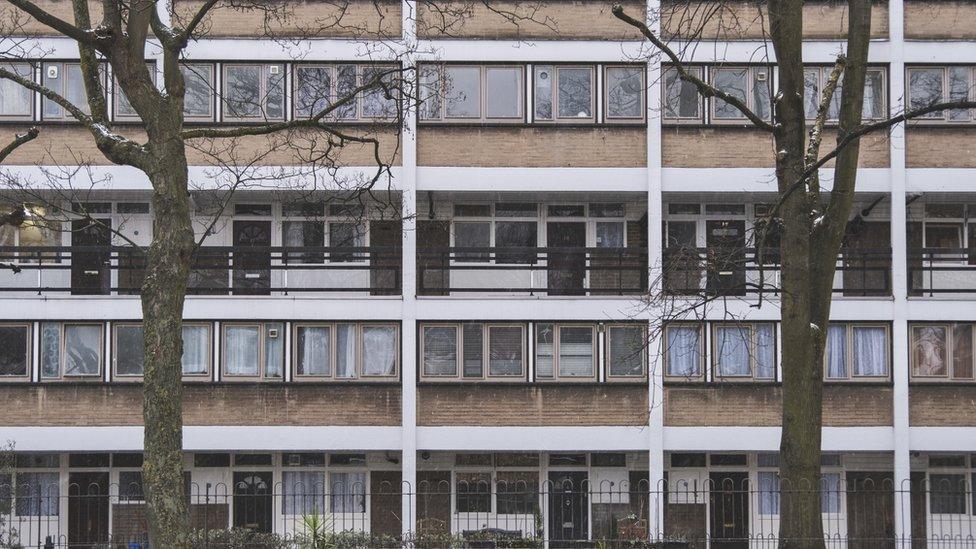Awaab Ishak: Plan to force landlords to tackle mouldy homes
- Published

Two-year-old Awaab Ishak died after he was exposed to mould at his family's home in Rochdale
Rogue social housing landlords could be forced to repair mouldy homes within 24 hours as part of government proposals after a toddler's death.
Campaigners have demanded reforms after two-year-old Awaab Ishak died from mould exposure at his Rochdale home in 2020.
The proposals would see new time limits set for repairs to unsafe homes.
Housing Secretary Michael Gove said the "strong, robust action" would help "prevent tragedies".
Known as Awaab's Law, the proposed legal changes would force landlords in England to investigate issues within two weeks, and begin repairs within a further seven days.
The two-year-old's father Faisal Abdullah said he hoped they would "stop any other family going through the pain that we went through".
He urged landlords to "listen to the concerns of tenants" after the issues he repeatedly raised with Rochdale Boroughwide Housing (RBH) about the state of the family's home were ignored.
Speaking at the time, Mr Abdullah, said he hoped those responsible would "get the punishment they deserve".
Campaigner Kwajo Tweneboa said it was crucial the proposals had "teeth" and were properly enforced.
Mr Gove said the toddler's death from a respiratory condition "should never have happened".
'Creating misery'
Mr Gove said the family had shown "courageous leadership, determination and dignity to champion these changes and now it's time for us to deliver".
Under the changes, any emergency work must be carried out within 24 hours, with those who fail to meet the new deadlines liable to be taken to court by tenants and ordered to pay compensation.
Housing campaigner Mr Tweneboa said: "Many families across the country are still living in homes with damp and mould, creating misery but more worryingly risks to their health and safety.
"I'm pleased to see Awaab's Law reach the consultation phase and hope that it goes far enough to prevent other families going through the tragedy Awaab's family have had to."
Landlords will also be expected to keep clear records for tenants to show they have made attempts to comply with the time limits.

Mayor of Greater Manchester Andy Burnham said there were many landlords "trying to do the right thing"
Meanwhile, the Mayor of Greater Manchester has announced a consultation on creating a new "good landlords charter" for the city.
Andy Burnham told the Today programme: "The charter needs to set clear standards, clear timetables for repairs to homes.
"It should be based on the principle that people's homes should not damage their physical or psychological health."
He said there were many landlords "trying to do the right thing" and the voluntary charter would see they are "getting recognition for doing that, differentiating themselves from poor landlords because there's no way at the moment that landlords can do that, they're all tarred with the same brush".
Simon Francis, coordinator of the End Fuel Poverty Coalition, said the "scale of the challenge can't be underestimated" after research found 850,000 adults living with young children experience mould frequently this winter.
He welcomed Mr Gove's proposals, but said they "do nothing for the millions of people who live in cold, damp or mouldy conditions in the private rented sector."
Speaking to BBC North West Tonight, Mr Gove said the government was trying to improve private sector housing through standards set in the renters reform bill, adding he would "look closely" at how the "good landlords charter" would work in Greater Manchester.
'Moved three times'
One mother told the BBC her family had been put up temporarily in a central Manchester flat after her three-year-old son was hospitalised seven times because of serious mould in their flat.
Louis, from Middleton, Rochdale, developed chronic breathing problems while living in the property.
His mother Amy said mould had spread from the skirting boards and walls to children's clothes, her mattress and pillows.
"We've been moved out to hotels three times, we're in an apartment now, but when I've been in a hotel he's never once been poorly, coughed, nothing," she said. "We were back home a week and then he ended up in hospital. I know that's what the cause is."

Mould is on the skirting boards and walls in Amy's family home in Rochdale
The government announcement follows the passing of the Social Housing Act last year, a move set to give the social housing regulator stronger powers to tackle rogue landlords.
An inquest in 2022 found Awaab died directly from a respiratory condition caused by exposure to mould - after his family's concerns were not acted upon.
Speaking at the time, Coroner Joanne Kearsley said the housing association was not "proactive" and asked: "How in the UK in 2020 does a two-year-old child die as a result of exposure to mould?"

Why not follow BBC North West on Facebook, external, X, external and Instagram, external? You can also send story ideas to northwest.newsonline@bbc.co.uk

Are you affected by the issues raised in this story? Get in touch by emailing haveyoursay@bbc.co.uk, external.
Please include a contact number if you are willing to speak to a BBC journalist. You can also get in touch in the following ways:
WhatsApp: +44 7756 165803
Tweet: @BBC_HaveYourSay, external
Please read our terms & conditions and privacy policy
If you are reading this page and can't see the form you will need to visit the mobile version of the BBC website to submit your question or comment or you can email us at HaveYourSay@bbc.co.uk, external. Please include your name, age and location with any submission.
Related topics
- Published4 January 2024

- Published22 December 2023

- Published17 November 2023

- Published17 October 2023

- Published21 July 2023

- Published27 June 2023

- Published15 November 2022
